Concept ‘hospitality’ in Kazakh, Russian and English Cultures
Concept ‘hospitality’ in Kazakh, Russian and English Cultures
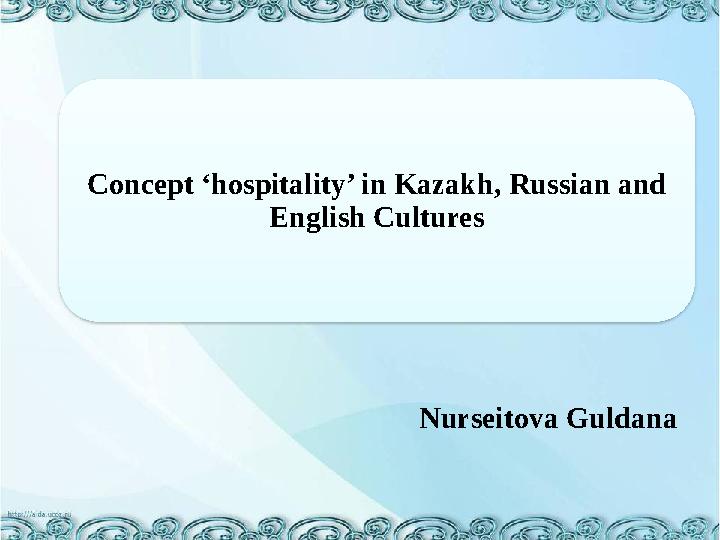

#1 слайд
Concept ‘hospitality’ in Kazakh, Russian and
English Cultures
Nurseitova Guldana
1 слайд
Concept ‘hospitality’ in Kazakh, Russian and English Cultures Nurseitova Guldana
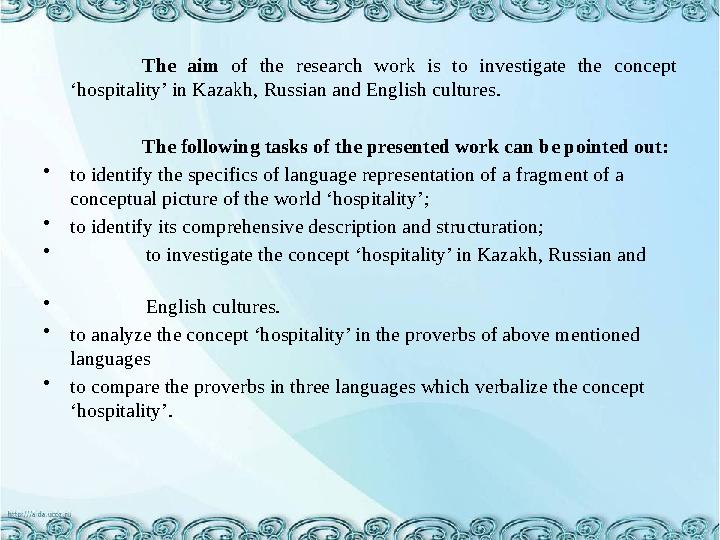
#2 слайд
The aim of the research work is to investigate the concept
‘hospitality’ in Kazakh, Russian and English cultures.
The following tasks of the presented work can be pointed out:
•
to identify the specifics of language representation of a fragment of a
conceptual picture of the world ‘hospitality’;
•
to identify its comprehensive description and structuration;
•
to investigate the concept ‘hospitality’ in Kazakh, Russian and
•
English cultures.
•
to analyze the concept ‘hospitality’ in the proverbs of above mentioned
languages
•
to compare the proverbs in three languages which verbalize the concept
‘hospitality’.
2 слайд
The aim of the research work is to investigate the concept ‘hospitality’ in Kazakh, Russian and English cultures. The following tasks of the presented work can be pointed out: • to identify the specifics of language representation of a fragment of a conceptual picture of the world ‘hospitality’; • to identify its comprehensive description and structuration; • to investigate the concept ‘hospitality’ in Kazakh, Russian and • English cultures. • to analyze the concept ‘hospitality’ in the proverbs of above mentioned languages • to compare the proverbs in three languages which verbalize the concept ‘hospitality’.
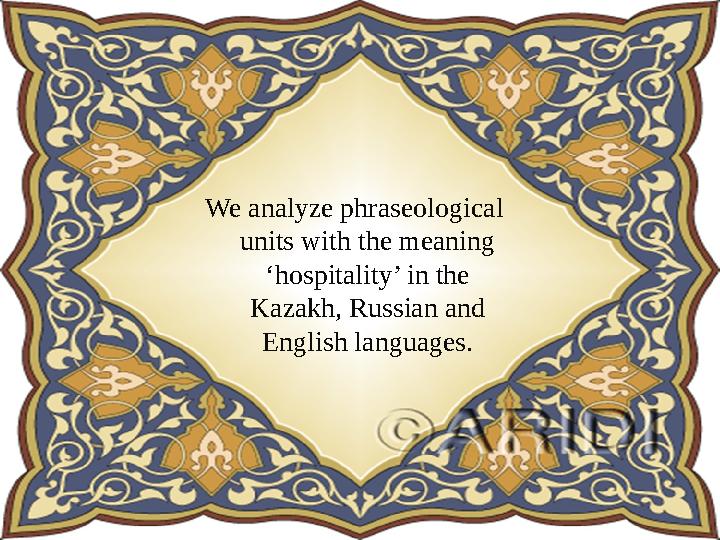
#3 слайд
We analyze phraseological
units with the meaning
‘hospitality’ in the
Kazakh, Russian and
English languages.
3 слайд
We analyze phraseological units with the meaning ‘hospitality’ in the Kazakh, Russian and English languages.
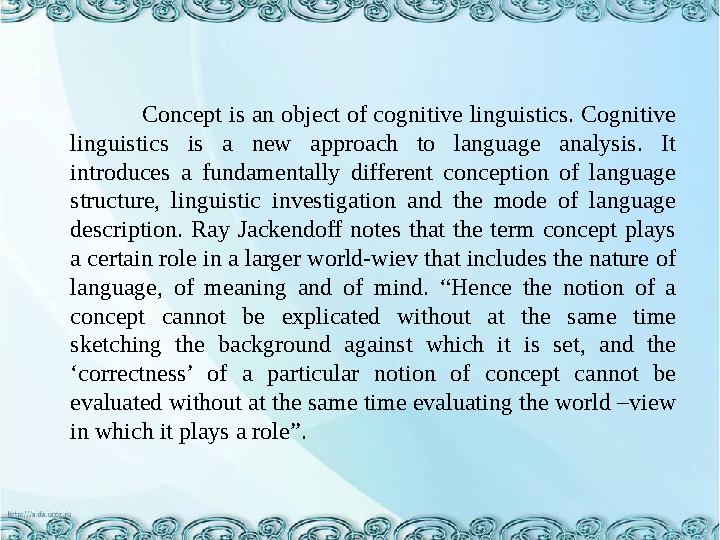
#4 слайд
Concept is an object of cognitive linguistics. Cognitive
linguistics is a new approach to language analysis. It
introduces a fundamentally different conception of language
structure, linguistic investigation and the mode of language
description. Ray Jackendoff notes that the term concept plays
a certain role in a larger world-wiev that includes the nature of
language, of meaning and of mind. “Hence the notion of a
concept cannot be explicated without at the same time
sketching the background against which it is set, and the
‘correctness’ of a particular notion of concept cannot be
evaluated without at the same time evaluating the world –view
in which it plays a role” .
4 слайд
Concept is an object of cognitive linguistics. Cognitive linguistics is a new approach to language analysis. It introduces a fundamentally different conception of language structure, linguistic investigation and the mode of language description. Ray Jackendoff notes that the term concept plays a certain role in a larger world-wiev that includes the nature of language, of meaning and of mind. “Hence the notion of a concept cannot be explicated without at the same time sketching the background against which it is set, and the ‘correctness’ of a particular notion of concept cannot be evaluated without at the same time evaluating the world –view in which it plays a role” .
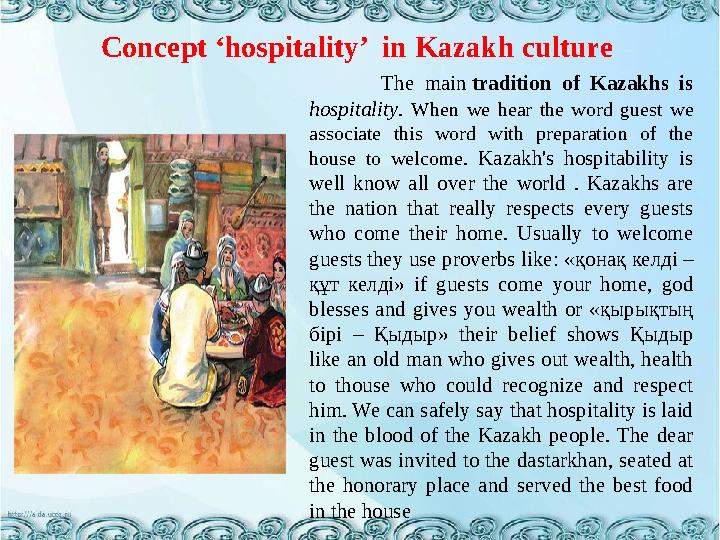
#5 слайд
Concept ‘hospitality’ in Kazakh culture
The main tradition of Kazakhs is
hospitality . When we hear the word guest we
associate this word with preparation of the
house to welcome. Kazakh's hospitability is
well know all over the world . Kazakhs are
the nation that really respects every guests
who come their home. Usually to welcome
guests they use proverbs like: « қонақ келді –
құт келді » if guests come your home, god
blesses and gives you wealth or « қырықтың
бірі – Қыдыр » their belief shows Қыдыр
like an old man who gives out wealth, health
to thouse who could recognize and respect
him. We can safely say that hospitality is laid
in the blood of the Kazakh people. The dear
guest was invited to the dastarkhan, seated at
the honorary place and served the best food
in the house
5 слайд
Concept ‘hospitality’ in Kazakh culture The main tradition of Kazakhs is hospitality . When we hear the word guest we associate this word with preparation of the house to welcome. Kazakh's hospitability is well know all over the world . Kazakhs are the nation that really respects every guests who come their home. Usually to welcome guests they use proverbs like: « қонақ келді – құт келді » if guests come your home, god blesses and gives you wealth or « қырықтың бірі – Қыдыр » their belief shows Қыдыр like an old man who gives out wealth, health to thouse who could recognize and respect him. We can safely say that hospitality is laid in the blood of the Kazakh people. The dear guest was invited to the dastarkhan, seated at the honorary place and served the best food in the house
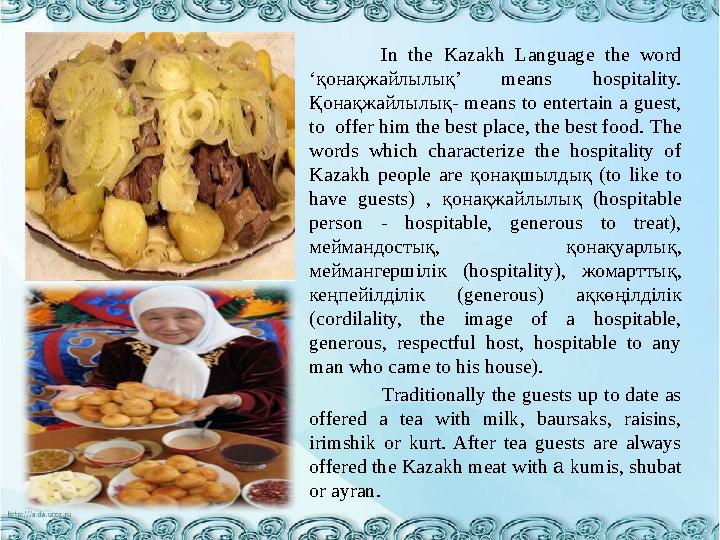
#6 слайд
In the Kazakh Language the word
‘ қонақжай лы лық ’ means hospitality.
Қонақжайлылық - means to entertain a guest,
to offer him the best place, the best food. The
words which characterize the hospitality of
Kazakh people are қонақшылдық (to like to
have guests) , қонақжайлылық (hospitable
person - hospitable, generous to treat),
меймандостық , қонақуарлық ,
меймангершілік (hospitality), жомарттық ,
кеңпейілділік (generous) ақкөңілділік
(cordilality, the image of a hospitable,
generous, respectful host, hospitable to any
man who came to his house).
Traditionally the guests up to date as
offered a tea with milk, baursaks, raisins,
irimshik or kurt. After tea guests are always
offered the Kazakh meat with a kumis, shubat
or ayran.
6 слайд
In the Kazakh Language the word ‘ қонақжай лы лық ’ means hospitality. Қонақжайлылық - means to entertain a guest, to offer him the best place, the best food. The words which characterize the hospitality of Kazakh people are қонақшылдық (to like to have guests) , қонақжайлылық (hospitable person - hospitable, generous to treat), меймандостық , қонақуарлық , меймангершілік (hospitality), жомарттық , кеңпейілділік (generous) ақкөңілділік (cordilality, the image of a hospitable, generous, respectful host, hospitable to any man who came to his house). Traditionally the guests up to date as offered a tea with milk, baursaks, raisins, irimshik or kurt. After tea guests are always offered the Kazakh meat with a kumis, shubat or ayran.
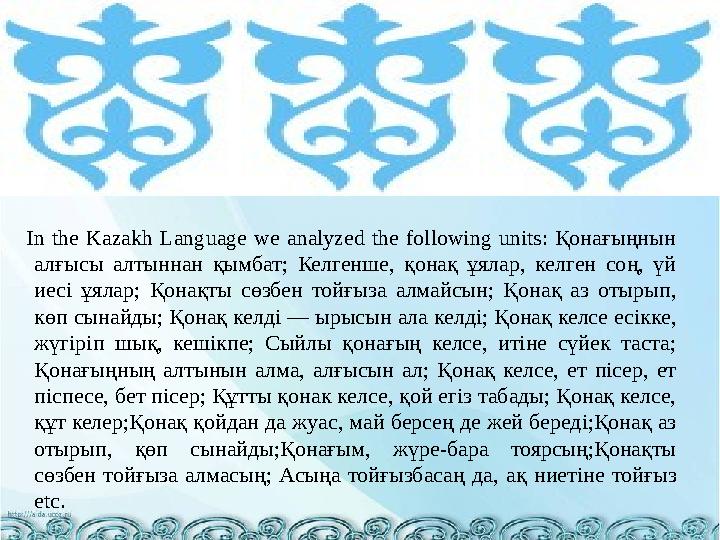
#7 слайд
In the Kazakh Language we analyzed the following units: Қонағыңнын
алғысы алтыннан қымбат; Келгенше, қонақ ұялар, келген соң, үй
иесі ұялар; Қонақты сөзбен тойғыза алмайсын; Қонақ аз отырып,
көп сынайды; Қонақ келді — ырысын ала келді; Қонақ келсе есікке,
жүгіріп шық, кешікпе; Сыйлы қонағың келсе, итіне сүйек таста;
Қонағыңның алтынын алма, алғысын ал; Қонақ келсе, ет пісер, ет
піспесе, бет пісер; Құтты қонак келсе, қой егіз табады; Қонақ келсе,
құт келер;Қонақ қойдан да жуас, май берсең де жей береді;Қонақ аз
отырып, қөп сынайды;Қонағым, жүре-бара тоярсың;Қонақты
сөзбен тойғыза алмасың; Асыңа тойғызбасаң да, ақ ниетіне тойғыз
etc.
7 слайд
In the Kazakh Language we analyzed the following units: Қонағыңнын алғысы алтыннан қымбат; Келгенше, қонақ ұялар, келген соң, үй иесі ұялар; Қонақты сөзбен тойғыза алмайсын; Қонақ аз отырып, көп сынайды; Қонақ келді — ырысын ала келді; Қонақ келсе есікке, жүгіріп шық, кешікпе; Сыйлы қонағың келсе, итіне сүйек таста; Қонағыңның алтынын алма, алғысын ал; Қонақ келсе, ет пісер, ет піспесе, бет пісер; Құтты қонак келсе, қой егіз табады; Қонақ келсе, құт келер;Қонақ қойдан да жуас, май берсең де жей береді;Қонақ аз отырып, қөп сынайды;Қонағым, жүре-бара тоярсың;Қонақты сөзбен тойғыза алмасың; Асыңа тойғызбасаң да, ақ ниетіне тойғыз etc.
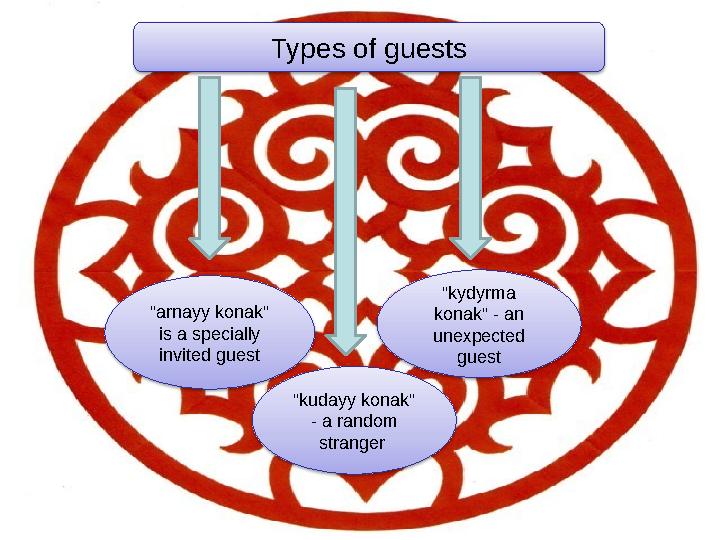
#8 слайд
Types of guests
"arnayy konak"
is a specially
invited guest
"kudayy konak"
- a random
stranger "kydyrma
konak" - an
unexpected
guest
8 слайд
Types of guests "arnayy konak" is a specially invited guest "kudayy konak" - a random stranger "kydyrma konak" - an unexpected guest
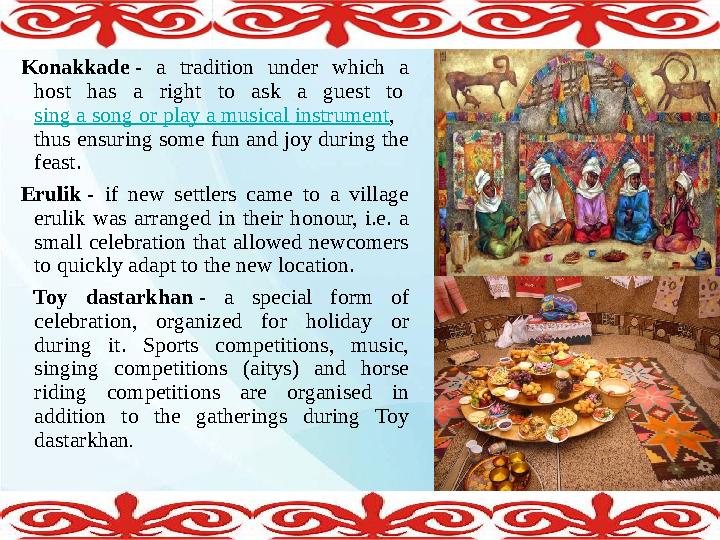
#9 слайд
Konakkade - a tradition under which a
host has a right to ask a guest to
sing a song or play a musical instrument ,
thus ensuring some fun and joy during the
feast.
Erulik - if new settlers came to a village
erulik was arranged in their honour, i.e. a
small celebration that allowed newcomers
to quickly adapt to the new location.
Toy dastarkhan - a special form of
celebration, organized for holiday or
during it. Sports competitions, music,
singing competitions (aitys) and horse
riding competitions are organised in
addition to the gatherings during Toy
dastarkhan .
9 слайд
Konakkade - a tradition under which a host has a right to ask a guest to sing a song or play a musical instrument , thus ensuring some fun and joy during the feast. Erulik - if new settlers came to a village erulik was arranged in their honour, i.e. a small celebration that allowed newcomers to quickly adapt to the new location. Toy dastarkhan - a special form of celebration, organized for holiday or during it. Sports competitions, music, singing competitions (aitys) and horse riding competitions are organised in addition to the gatherings during Toy dastarkhan .
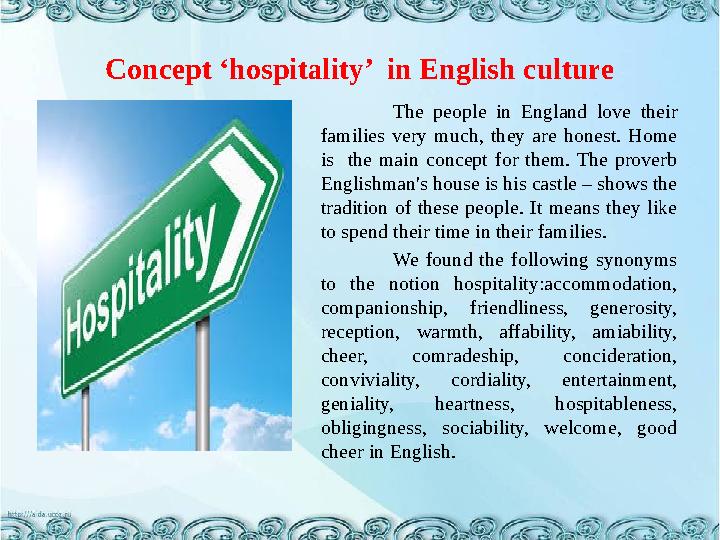
#10 слайд
Concept ‘hospitality’ in English culture
The people in England love their
families very much, they are honest. Home
is the main concept for them. The proverb
Englishman's house is his castle – shows the
tradition of these people. It means they like
to spend their time in their families.
We found the following synonyms
to the notion hospitality:accommodation,
companionship, friendliness, generosity,
reception, warmth, affability, amiability,
cheer, comradeship, concideration,
conviviality, cordiality, entertainment,
geniality, heartness, hospitableness,
obligingness, sociability, welcome, good
cheer in English.
10 слайд
Concept ‘hospitality’ in English culture The people in England love their families very much, they are honest. Home is the main concept for them. The proverb Englishman's house is his castle – shows the tradition of these people. It means they like to spend their time in their families. We found the following synonyms to the notion hospitality:accommodation, companionship, friendliness, generosity, reception, warmth, affability, amiability, cheer, comradeship, concideration, conviviality, cordiality, entertainment, geniality, heartness, hospitableness, obligingness, sociability, welcome, good cheer in English.
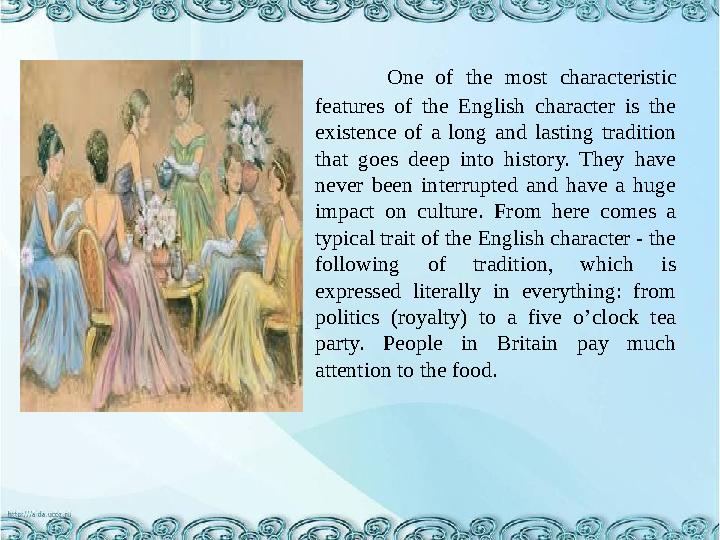
#11 слайд
One of the most characteristic
features of the English character is the
existence of a long and lasting tradition
that goes deep into history. They have
never been interrupted and have a huge
impact on culture. From here comes a
typical trait of the English character - the
following of tradition, which is
expressed literally in everything: from
politics (royalty) to a five o’clock tea
party. People in Britain pay much
attention to the food.
11 слайд
One of the most characteristic features of the English character is the existence of a long and lasting tradition that goes deep into history. They have never been interrupted and have a huge impact on culture. From here comes a typical trait of the English character - the following of tradition, which is expressed literally in everything: from politics (royalty) to a five o’clock tea party. People in Britain pay much attention to the food.
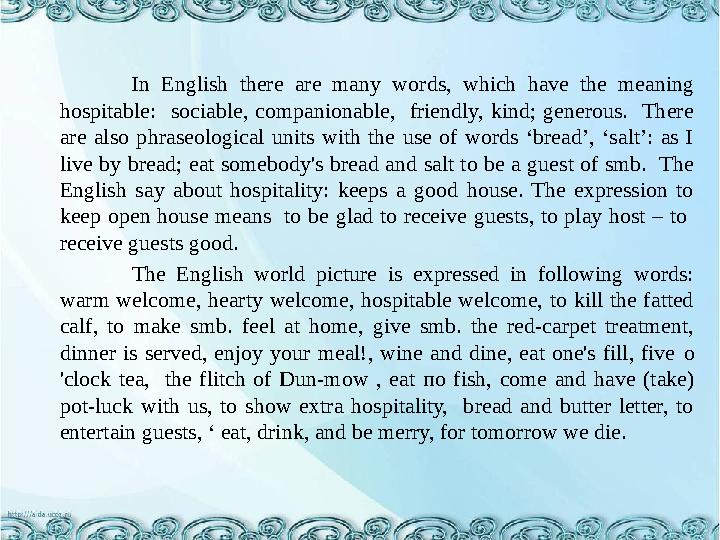
#12 слайд
In English there are many words, which have the meaning
hospitable: sociable, companionable, friendly, kind; generous. There
are also phraseological units with the use of words ‘bread’, ‘salt’: as I
live by bread; eat somebody's bread and salt to be a guest of smb. The
English say about hospitality: keeps a good house. The expression to
keep open house means to be glad to receive guests, to play host – to
receive guests good.
The English world picture is expressed in following words:
warm welcome, hearty welcome, hospitable welcome, to kill the fatted
calf, to make smb. feel at home, give smb. the red-carpet treatment,
dinner is served, enjoy your meal!, wine and dine, eat one's fill, five о
'clock tea, the flitch of Dun-mow , eat по fish, come and have (take)
pot-luck with us, to show extra hospitality, bread and butter letter, to
entertain guests, ‘ eat, drink, and be merry, for tomorrow we die.
12 слайд
In English there are many words, which have the meaning hospitable: sociable, companionable, friendly, kind; generous. There are also phraseological units with the use of words ‘bread’, ‘salt’: as I live by bread; eat somebody's bread and salt to be a guest of smb. The English say about hospitality: keeps a good house. The expression to keep open house means to be glad to receive guests, to play host – to receive guests good. The English world picture is expressed in following words: warm welcome, hearty welcome, hospitable welcome, to kill the fatted calf, to make smb. feel at home, give smb. the red-carpet treatment, dinner is served, enjoy your meal!, wine and dine, eat one's fill, five о 'clock tea, the flitch of Dun-mow , eat по fish, come and have (take) pot-luck with us, to show extra hospitality, bread and butter letter, to entertain guests, ‘ eat, drink, and be merry, for tomorrow we die.
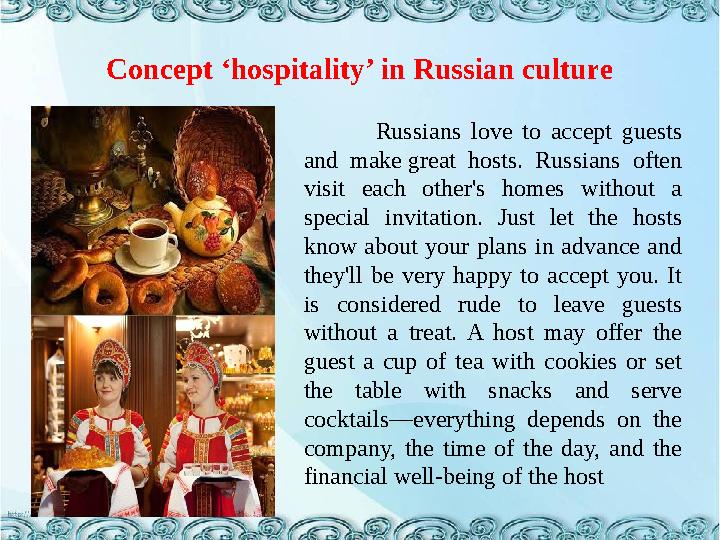
#13 слайд
Concept ‘hospitality’ in Russian culture
Russians love to accept guests
and make great hosts. Russians often
visit each other's homes without a
special invitation. Just let the hosts
know about your plans in advance and
they'll be very happy to accept you. It
is considered rude to leave guests
without a treat. A host may offer the
guest a cup of tea with cookies or set
the table with snacks and serve
cocktails—everything depends on the
company, the time of the day, and the
financial well-being of the host
13 слайд
Concept ‘hospitality’ in Russian culture Russians love to accept guests and make great hosts. Russians often visit each other's homes without a special invitation. Just let the hosts know about your plans in advance and they'll be very happy to accept you. It is considered rude to leave guests without a treat. A host may offer the guest a cup of tea with cookies or set the table with snacks and serve cocktails—everything depends on the company, the time of the day, and the financial well-being of the host
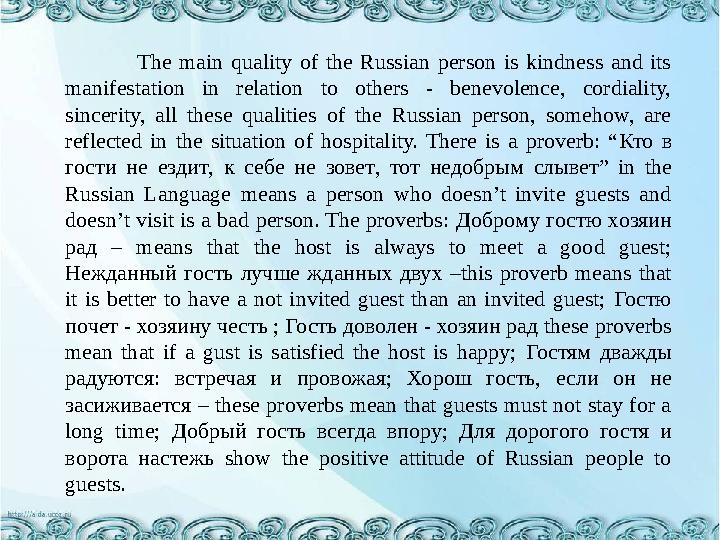
#14 слайд
The main quality of the Russian person is kindness and its
manifestation in relation to others - benevolence, cordiality,
sincerity, all these qualities of the Russian person, somehow, are
reflected in the situation of hospitality. There is a proverb: “ Кто в
гости не ездит , к себе не зовет , тот недобрым слывет ” in the
Russian Language means a person who doesn’t invite guests and
doesn’t visit is a bad person. The proverbs: Доброму гостю хозяин
рад – means that the host is always to meet a good guest;
Нежданный гость лучше жданных двух –this proverb means that
it is better to have a not invited guest than an invited guest; Гостю
почет - хозяину честь ; Гость доволен - хозяин рад these proverbs
mean that if a gust is satisfied the host is happy; Гостям дважды
радуются : встречая и провожая ; Хорош гость , если он не
засиживается – these proverbs mean that guests must not stay for a
long time; Добрый гость всегда впору ; Для дорогого гостя и
ворота настежь show the positive attitude of Russian people to
guests.
14 слайд
The main quality of the Russian person is kindness and its manifestation in relation to others - benevolence, cordiality, sincerity, all these qualities of the Russian person, somehow, are reflected in the situation of hospitality. There is a proverb: “ Кто в гости не ездит , к себе не зовет , тот недобрым слывет ” in the Russian Language means a person who doesn’t invite guests and doesn’t visit is a bad person. The proverbs: Доброму гостю хозяин рад – means that the host is always to meet a good guest; Нежданный гость лучше жданных двух –this proverb means that it is better to have a not invited guest than an invited guest; Гостю почет - хозяину честь ; Гость доволен - хозяин рад these proverbs mean that if a gust is satisfied the host is happy; Гостям дважды радуются : встречая и провожая ; Хорош гость , если он не засиживается – these proverbs mean that guests must not stay for a long time; Добрый гость всегда впору ; Для дорогого гостя и ворота настежь show the positive attitude of Russian people to guests.
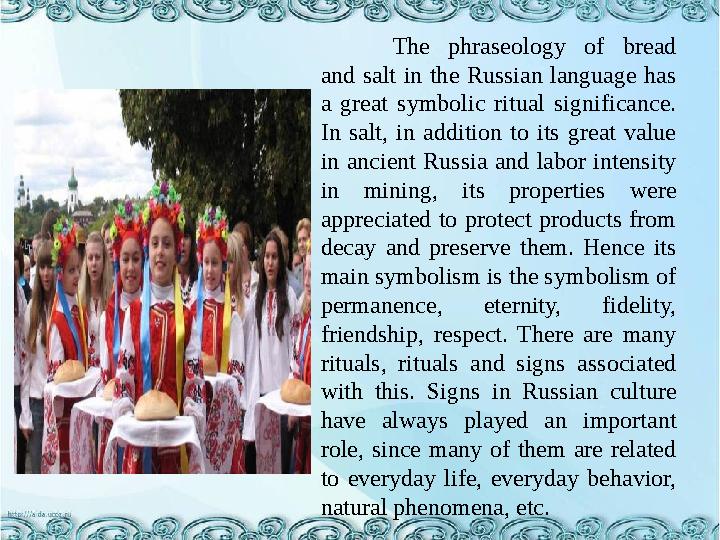
#15 слайд
The phraseology of bread
and salt in the Russian language has
a great symbolic ritual significance.
In salt, in addition to its great value
in ancient Russia and labor intensity
in mining, its properties were
appreciated to protect products from
decay and preserve them. Hence its
main symbolism is the symbolism of
permanence, eternity, fidelity,
friendship, respect. There are many
rituals, rituals and signs associated
with this. Signs in Russian culture
have always played an important
role, since many of them are related
to everyday life, everyday behavior,
natural phenomena, etc.
15 слайд
The phraseology of bread and salt in the Russian language has a great symbolic ritual significance. In salt, in addition to its great value in ancient Russia and labor intensity in mining, its properties were appreciated to protect products from decay and preserve them. Hence its main symbolism is the symbolism of permanence, eternity, fidelity, friendship, respect. There are many rituals, rituals and signs associated with this. Signs in Russian culture have always played an important role, since many of them are related to everyday life, everyday behavior, natural phenomena, etc.
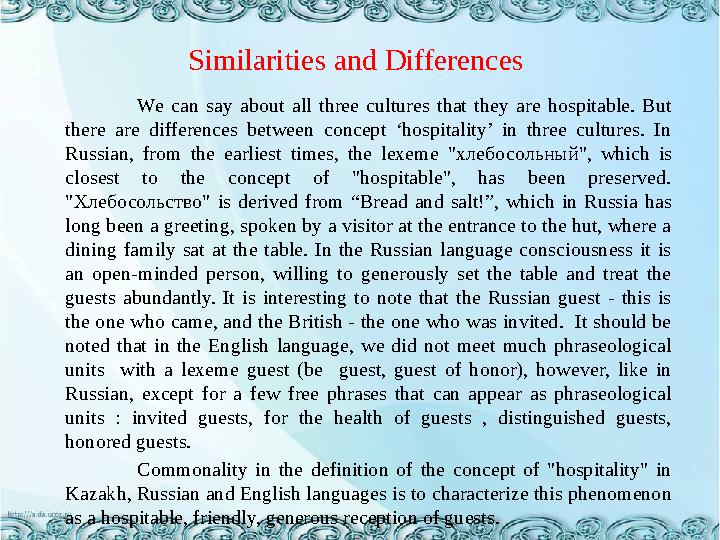
#16 слайд
Similarities and Differences
We can say about all three cultures that they are hospitable. But
there are differences between concept ‘hospitality’ in three cultures. In
Russian, from the earliest times, the lexeme " хлебосольный ", which is
closest to the concept of "hospitable", has been preserved.
" Хлебосольство " is derived from “Bread and salt!”, which in Russia has
long been a greeting, spoken by a visitor at the entrance to the hut, where a
dining family sat at the table. In the Russian language consciousness it is
an open-minded person, willing to generously set the table and treat the
guests abundantly. It is interesting to note that the Russian guest - this is
the one who came, and the British - the one who was invited. It should be
noted that in the English language, we did not meet much phraseological
units with a lexeme guest (be guest, guest of honor), however, like in
Russian, except for a few free phrases that can appear as phraseological
units : invited guests, for the health of guests , distinguished guests,
honored guests.
Commonality in the definition of the concept of "hospitality" in
Kazakh, Russian and English languages is to characterize this phenomenon
as a hospitable, friendly, generous reception of guests.
16 слайд
Similarities and Differences We can say about all three cultures that they are hospitable. But there are differences between concept ‘hospitality’ in three cultures. In Russian, from the earliest times, the lexeme " хлебосольный ", which is closest to the concept of "hospitable", has been preserved. " Хлебосольство " is derived from “Bread and salt!”, which in Russia has long been a greeting, spoken by a visitor at the entrance to the hut, where a dining family sat at the table. In the Russian language consciousness it is an open-minded person, willing to generously set the table and treat the guests abundantly. It is interesting to note that the Russian guest - this is the one who came, and the British - the one who was invited. It should be noted that in the English language, we did not meet much phraseological units with a lexeme guest (be guest, guest of honor), however, like in Russian, except for a few free phrases that can appear as phraseological units : invited guests, for the health of guests , distinguished guests, honored guests. Commonality in the definition of the concept of "hospitality" in Kazakh, Russian and English languages is to characterize this phenomenon as a hospitable, friendly, generous reception of guests.
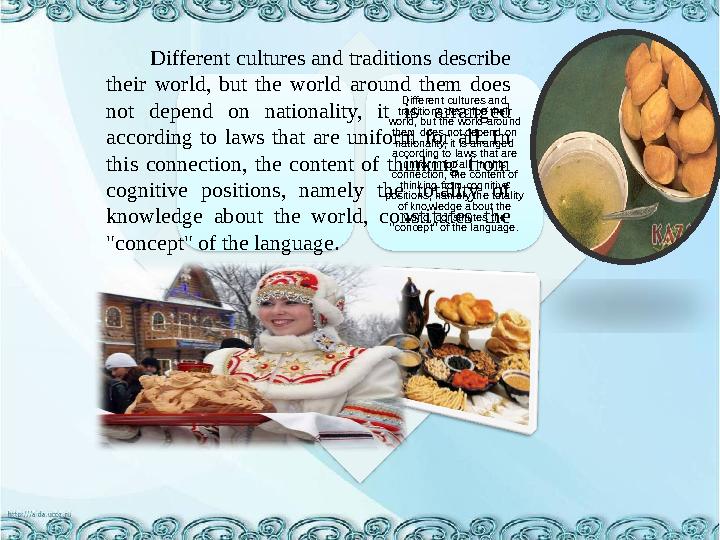
#17 слайд
Different cultures and
traditions describe their
world, but the world around
them does not depend on
nationality, it is arranged
according to laws that are
uniform for all. In this
connection, the content of
thinking from cognitive
positions, namely the totality
of knowledge about the
world, constitutes the
"concept" of the language. Different cultures and traditions describe
their world, but the world around them does
not depend on nationality, it is arranged
according to laws that are uniform for all. In
this connection, the content of thinking from
cognitive positions, namely the totality of
knowledge about the world, constitutes the
"concept" of the language.
17 слайд
Different cultures and traditions describe their world, but the world around them does not depend on nationality, it is arranged according to laws that are uniform for all. In this connection, the content of thinking from cognitive positions, namely the totality of knowledge about the world, constitutes the "concept" of the language. Different cultures and traditions describe their world, but the world around them does not depend on nationality, it is arranged according to laws that are uniform for all. In this connection, the content of thinking from cognitive positions, namely the totality of knowledge about the world, constitutes the "concept" of the language.
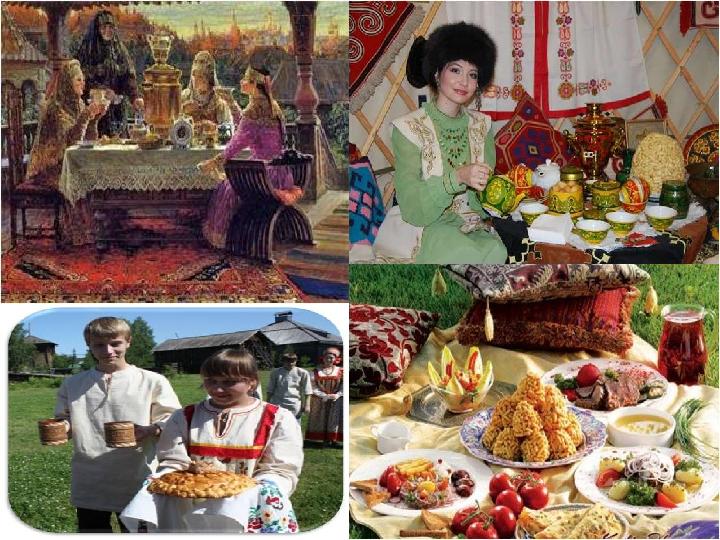
#18 слайд
18 слайд

#19 слайд
19 слайд

шағым қалдыра аласыз
















